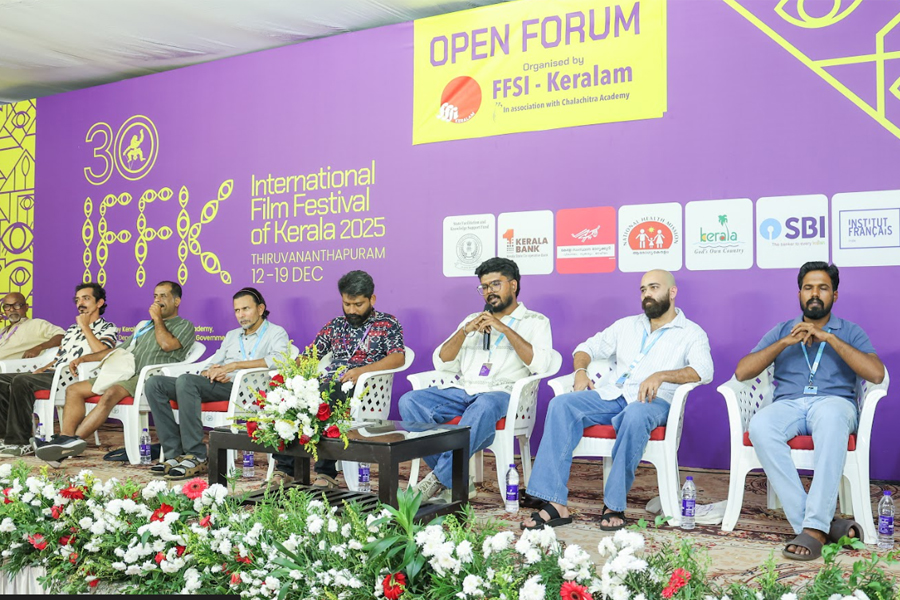Programmes
Courage to be oneself: Verónica González
Meet the Director
Uruguayan filmmaker Verónica Perrot González, director of Quemadura China, underscored the value of artistic individuality and self-assurance at the ‘Meet the Director’ session held at Tagore Theatre on the second day of the 30th IFFK.
“The foremost quality a good director must have is the courage to be oneself. That confidence helped me complete low-budget films beautifully,” Verónica said, highlighting how passion and self-belief are essential to navigating the challenges of cinema. When asked about the qualities that define a successful filmmaker, she added, “If we do anything with passion, we can overcome all its challenges.”
Visiting Kerala for the first time, Verónica saw her film screened in the festival’s Latin American category. She offered audiences a behind-the-scenes look at Quemadura China and reflected on the broader lessons of direction, insisting that true satisfaction lies not in following conventional paths but in carving one’s own creative journey.
Quemadura China explores the lives of Siamese twin brothers who decide to undergo separation surgery, portraying the complex emotional and psychological terrain of such a life-altering choice. The film delves into human conflict, the fragility of relationships, and the resilience of the human spirit.
The session also featured Malayalam filmmaker Jeo Baby, who spoke about his upcoming project Ebb. Emphasizing cinema’s ability to observe human conditions closely and evoke empathy, Jeo Baby discussed the ways his film intertwines individual lives through the universal emotion of love, while offering guidance to newcomers navigating the cinematic landscape.
Anirudh Lokkur, executive producer of the Kannada film Don’t Tell Mother, shared insights on the project helmed by his brother Anoop Lokkur. Malayalam veteran Balu Kiriyath also participated, adding perspective on filmmaking across regions and genres.
Moderated by Meera Sahib, the session provided a dynamic platform for filmmakers and audiences to engage on creativity, storytelling, and the evolving language of cinema, highlighting both the personal and universal dimensions of the art form.
Tagore Theatre
11:00 | December 13, 2025
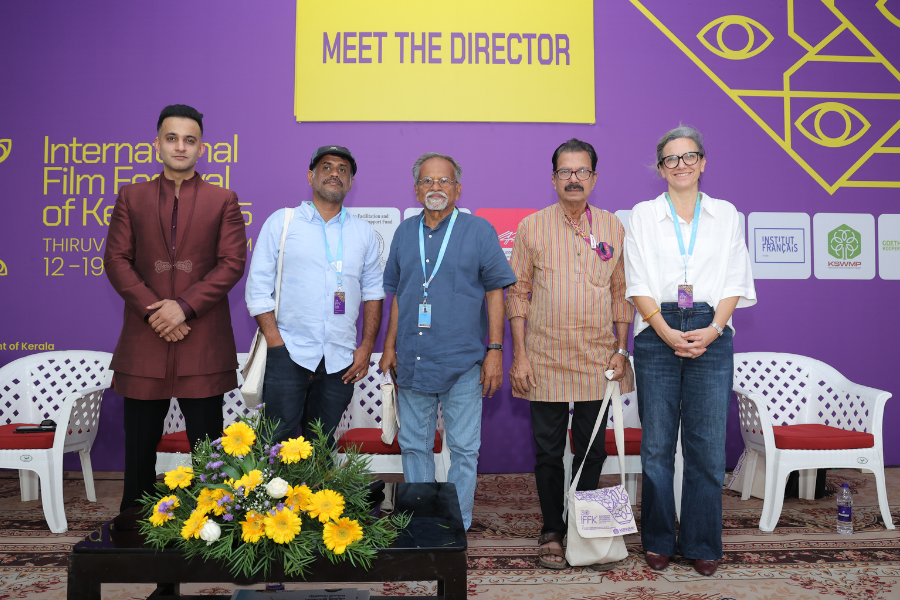
First Open Forum at IFFK Explores Doors to Cinematic Freedom
Open Forum
The 30th edition of IFFK opened its first Open Forum with an engaging session inaugurated by veteran filmmaker Syed Mirza, setting the tone for a series of critical discussions that bring together filmmakers, critics, and audiences. Designed as a platform for dialogue on contemporary cinematic practices, the Open Forum aims to interrogate both the creative and structural challenges of modern filmmaking.
The inaugural session, titled “Doors to Cinematic Freedom: New Environments and Challenges in Cinema”, was moderated by Nizam Assaf and focused on the evolving nature of cinema, the cultivation of democratic spaces within the industry, and the impact of emerging technologies. Among those in attendance were Kelly Fiffe Marshall, recipient of this year’s Spirit of Cinema Award; K. Hariharan, Chairman of the FFSI Kerala Jury and renowned filmmaker; and acclaimed director T. V. Chandran.
T. V. Chandran reflected on the increasingly democratic character of cinema, arguing that the medium thrives when its environment nurtures dialogue and inclusion. He highlighted primary education as the foundational “soil” for democratic growth in India and globally, emphasizing that a well informed audience is essential for meaningful cinematic engagement.
The session also addressed the intersection of technology and artistry. Discussing concerns that artificial intelligence might stifle creativity, Syed Mirza reminded the audience that similar anxieties arose during previous technological shifts in cinema, from the advent of sound and colour to the introduction of computers. Drawing from these experiences, he expressed confidence that AI, like its predecessors, would serve as a tool for growth, enriching rather than constraining the cinematic landscape.
Kerala State Chalachitra Academy Secretary C. Ajoy was also present, underscoring the forum’s significance as a space where filmmakers, critics, and policymakers converge to reflect on cinema’s past, present, and future.
Tagore Theatre
05:00 | December 13, 2025
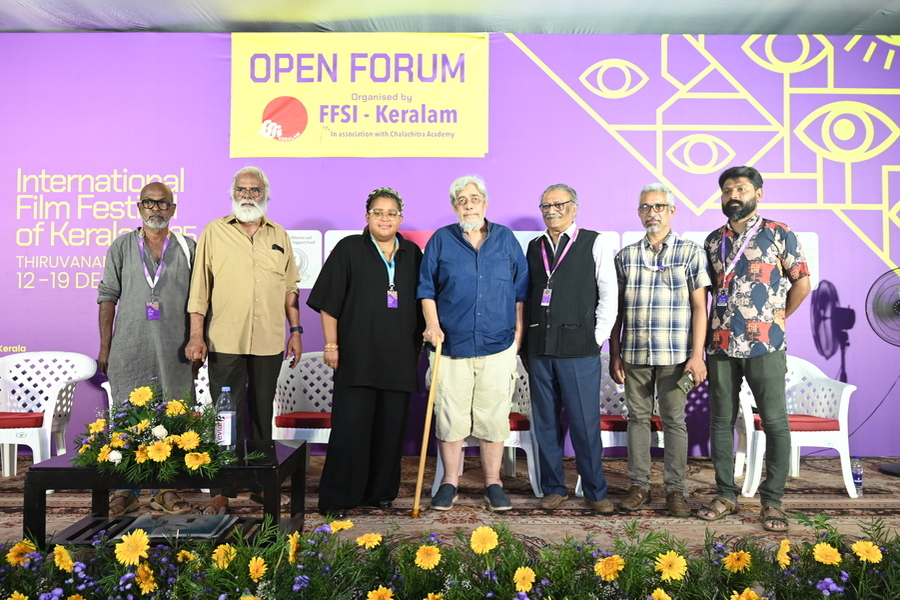
Your attire doesn’t define your sense of Freedom: Tannishtha Chatterjee
Meet the Director
“What you wear doesn’t define your sense of freedom. A person wearing a hijab can have more liberated thoughts than someone wearing jeans,” director and actor Tannishtha Chatterjee opined, stressing that clothing should never be used as a measure of personal freedom. She was speaking at the Meet the Director session held on 15 December 2025 at the IFFK.
She also emphasised that attire is shaped by cultural circumstances and habits, and should not become a yardstick to judge an individual’s mental or ideological freedom. Her film Full Plate, screened at the festival, strongly reflects these ideas. Chatterjee, whose work won the Marie Claire Visionary Director Award at the Busan International Film Festival, noted that the film engages with contemporary Indian political realities, where food, religion, caste, and class have increasingly become central to public discourse.
The session, moderated by filmmaker Balu Kiriyath, turned into a vibrant forum for filmmakers to exchange perspectives on cinema and socio-political themes. Several notable directors participated, sharing insights into their works.
Nipin Narayanan, Arun Varghese, and Adithya Baby discussed their psychological and experimental films, while Dr. Biju spoke about Papa Buka, Papua New Guinea’s Oscar entry. International voices also enriched the discussion, with Chilean filmmaker Pablo Larraín, Ecuadorian director Ana Cristina Barragán, and debut director Anuparna Roy sharing their experiences and creative journeys, reinforcing IFFK as a key platform for expressing identity and contemporary realities.
Tagore Theatre
11:00 | December 14, 2025
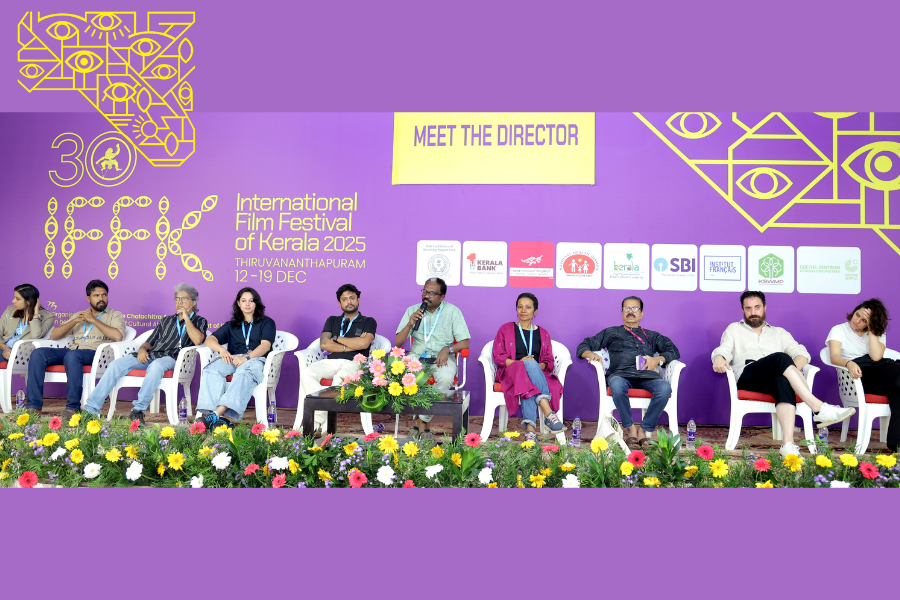
Open Forum Explores Patriarchy in Indian Cinema: Power, Gender, Politics
Open Forum
At an engaging open forum titled Patriarchy in Indian Cinema: Power, Gender, Politics, held at the 30th IFFK on 14 December 2025, the complexities of gender bias in the film industry were examined, shedding light on how such discrimination influences the success of films.
The discussion revolved around the idea that while women-centric films are celebrated for their success, these achievements are often attributed to collective effort, whereas the success of male-centric films is frequently framed as the individual accomplishment of the protagonist. The forum also delved into disparities in the portrayal of male and female characters, as well as the nuanced representations of male gay identities in cinema, sparking significant debate.
Moderated by Shreya Sreekumar, the forum brought together a distinguished panel including film critic G.P. Ramachandran, dubbing artist Bhagyalakshmi, researcher Dr. Rekha Raj, director Mini I.G., and film critic Dr. Anu Pappachan.
Director Mini I.G. emphasized the urgent need to recognize and accept the leadership and creative contributions of women in creative sectors. Bhagyalakshmi highlighted the prevailing complexities within the industry, underscoring the powerful influence of circulating misinformation. She also referred to the actress attack case, noting that the survivor initially received little to no support from the film industry and was forced to fight the battle alone.
It was noted that while male actors are often celebrated with special titles, such recognition is seldom extended to their female counterparts. Dr. G.P. Ramachandran pointed out that the gender pay gap in the industry reflects broader societal inequalities, with women receiving lower compensation despite equal contributions to film successes.
The forum also saw the release of the cover of the book Penthira by Dr. Anu Pappachan, marking another step in the ongoing conversation on gender and power in the cinematic world.
Tagore Theatre
05:00 | December 14, 2025

Cinema is never Innocent: Pablo Larraín
Masterclass
The third day of the 30th IFFK was marked by critical reflection and intellectual intensity as acclaimed Chilean filmmaker Pablo Larraín delivered a compelling lecture at the Masterclass session at the Nila Theatre. The session offered a rigorous examination of cinema’s ethical responsibility, artistic intent, and its enduring power to shape collective memory.
Larraín, a leading figure in contemporary world cinema, is known for films such as Jackie, Spencer, El Conde, and No, the first Chilean film to receive an Academy Award nomination for Best Foreign Language Film. Speaking with striking honesty, he reflected on failure as an essential teacher in his creative journey. Early setbacks, he noted, taught him the importance of protecting and understanding characters, insisting that they must be approached with clarity, care, and empathy.
According to Larraín, characters function as mirrors through which audiences recognise themselves. When that mirror is distorted, empathy dissolves. He strongly criticised formulaic storytelling, particularly narratives that degrade characters only to later redeem them, describing such approaches as intellectually dishonest and creatively complacent.
Addressing the process of learning cinema, Larraín observed that while film schools can provide guidance, they cannot impart the core sensibility required for filmmaking. True understanding, he argued, emerges from a deep engagement with history, philosophy, and literature, combined with sustained viewing and the lived experience of making films. Technique may be taught, but sensibility, he emphasised, must be cultivated.
Politics, for Larraín, is inescapable. Every film, regardless of its scale or genre, conveys a vision of society and is therefore inherently political. He described cinema as a powerful illusion—one that demands honesty, precision of perspective, and moral courage.
The masterclass concluded as a call to resist complacency. Larraín urged filmmakers to embrace complexity, confront political realities, and trust their audiences, reaffirming his belief that cinema’s true strength lies not in comfort or appeasement, but in intellectual and emotional integrity.
Kairali Sree Nila
02:30 | December 14, 2025
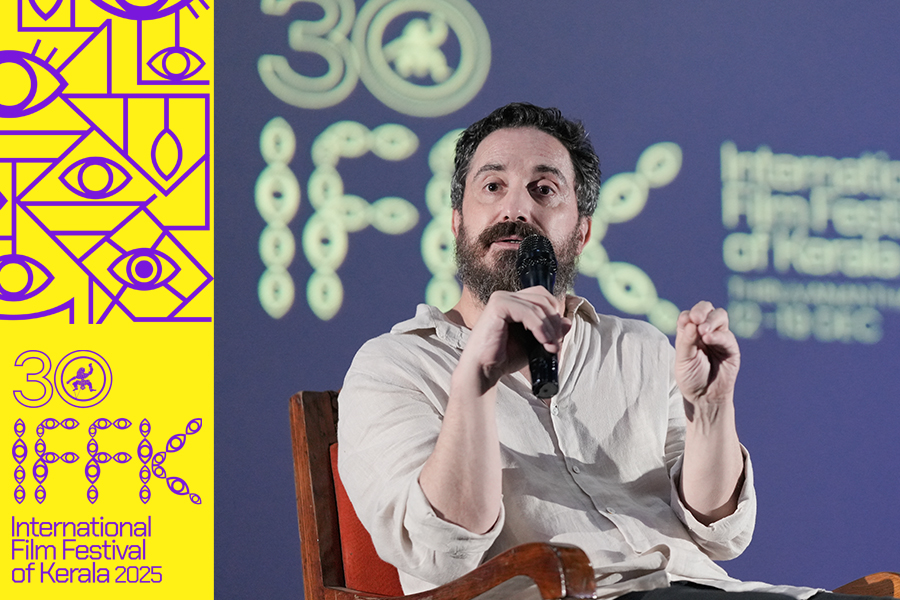
Realising Dreams: Directors share their cinematic journeys
Meet the Director
The Meet the Directors session at the 30th IFFK, moderated by veteran filmmaker and writer Balu Kiriyath at Tagore Theatre, offered an unvarnished look at the trials, persistence, and ingenuity behind independent filmmaking. Directors from across regions candidly recounted the financial, logistical, and creative hurdles they navigated to bring their visions to the screen.
For Ishan Ghosh, Mirage was a test of improvisation and trust. He reflected on his unconventional approach of working without a script, relying instead on friends and a small Sony camera. Despite criticism, Ghosh insisted that his focus was solely on completing the film, underscoring the patience and perseverance required to see a project through to its end.
Mini I. G. described the journey of Aadi Snehathimin Virunumeshayil as a race against constraints. Without a producer, and with many crew members working without remuneration, the film was completed in a remarkably short time. Mini also recalled her early years as an IFFK delegate, nurturing the dream of one day screening her own work at the festival—a goal she finally achieved.
For debut director Rajesh Madhavan, Pennum Porattum was an exercise in spontaneity and authenticity. He explained that pre-written dialogues were not feasible, and the team recorded sound live on set, a decision that added realism but also complexity to the filmmaking process.
Sreekumar K. described undertaking Anyarude Akashangal purely for its thematic relevance, while directors Sreejith S. Kumar and Grito Vincent spoke about the challenges of producing Sheshipp, a film based on life during the COVID-19 pandemic, particularly the difficulty of securing producers for a project with a largely new cast.
The session also saw contributions from Soumyananda Sahi, director of Shadow Box, which premiered at the Berlin International Film Festival, and Ravi Shankar Kaushik, director of Lapteen, highlighting the diversity of stories and production realities represented at IFFK. Together, the directors’ narratives offered a vivid glimpse into the courage, resourcefulness, and creative determination that sustain independent cinema.
Tagore Theatre
11:00 | December 15, 2025
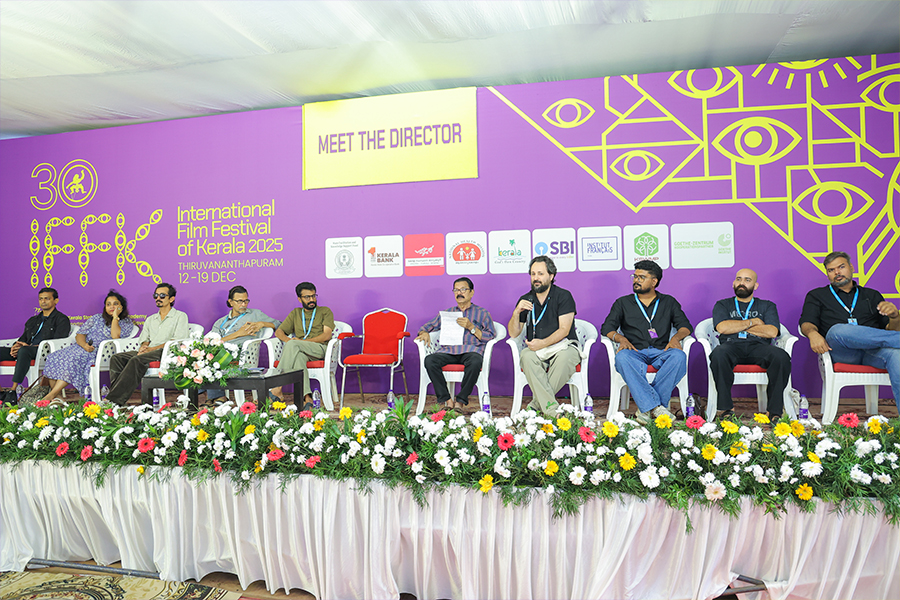
Exploring Constructive Intelligence to Censorship
Open Forum
An engaging open forum was held on 15 December 2025 as part of the 30th IFFK, bringing together directors Gautam Ghosh and T. V. Chandran, along with film critics Premendra Majumdar, Aparajita Pujari, and Sridevi P. Aravind. The session, moderated by Jithin C., focused on the theme “How Constructive Intelligence Influences Contemporary Criticism.”
Gautam Ghosh expressed that constructive intelligence should not be seen as a threat; rather, it represents a phase in the ongoing development of cinema, comparable to the historical transition from black-and-white to color films.
Director T. V. Chandran added that the real challenge lies not in constructive intelligence itself, but in the absence of creative minds. “Good thoughts create good films,” he emphasized, highlighting the enduring importance of imagination and vision in filmmaking.
Aparajita Pujari compared constructive intelligence to a tiger that can be tamed, emphasizing the need for awareness of its potential and advocating a responsible approach to its use. Sridevi P. Aravind added that classic films, such as Battleship Potemkin, are products of human creative thought, and no artificial intelligence could ever replicate such works.
During the event, Gautam Ghosh presented the FIPRESCI Lifetime Achievement Award to T. V. Chandran, with FIPRESCI India President V. K. Joseph presiding. Ghosh praised Chandran’s films as rich and nuanced works that subtly explore social constraints. Director Kamal also spoke, and the session was attended by editor and translator Latika Padgaonkar, along with G. P. Ramachandran and Madhu Janardhanan. Additionally, Ghosh presented and released the book Ritwik Ghatak: Unyielding Visionary, edited by P. R. Balakrishnan, to T. V. Chandran.
Filmmakers at the forum also voiced concerns regarding the Union Ministry of Information and Broadcasting’s decision to exclude 19 films from screening at the IFFK. The session provided a thought-provoking discussion on the evolving interplay between technology, creativity, and critical discourse in contemporary cinema.
Tagore Theatre
05:00 | December 15, 2025
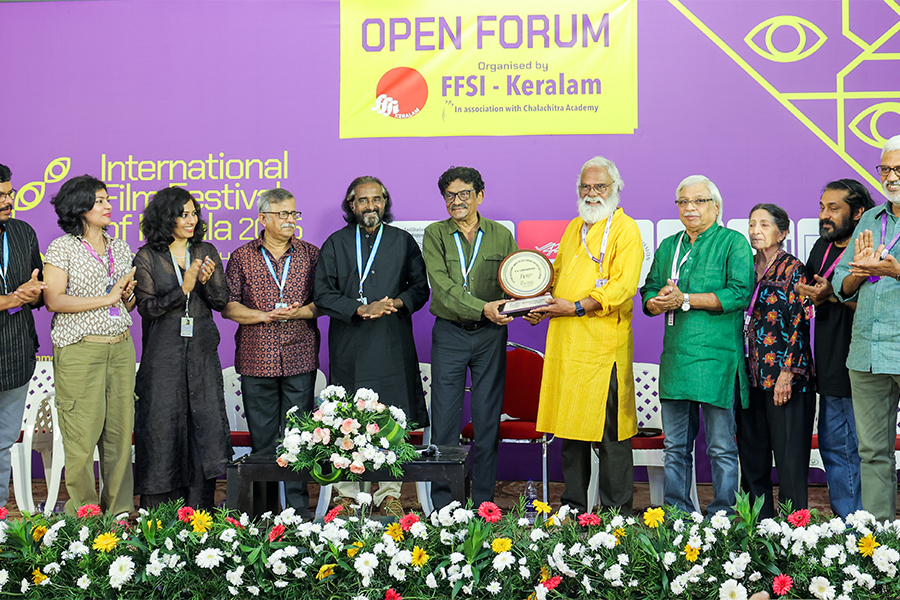
Cinema and the emotion behind storytelling
Lecture
“Cinema is the most powerful medium for communicating ideas. Beyond dialogues, images, sounds, and even silence can convey the essence of cinema to the audience,” noted veteran Mauritanian director and IFFK Lifetime Achievement Award winner Abderrahmane Sissako. He was delivering the G. Aravindan Memorial Lecture at Nila Theatre on 15 December 2025, as part of the 30th IFFK.
Sissako emphasized that in contemporary cinema, the way a film is presented often carries more significance than the idea itself. He stressed that what matters most is whether the film effectively conveys its intended subject to the audience. Reflecting on his own connection to cinema, Sissako added that the strong driving emotion behind his work is love, particularly the deep affection for his mother, which has shaped his cinematic vision.
Kairali Sree Nila
02:30 | December 15, 2025
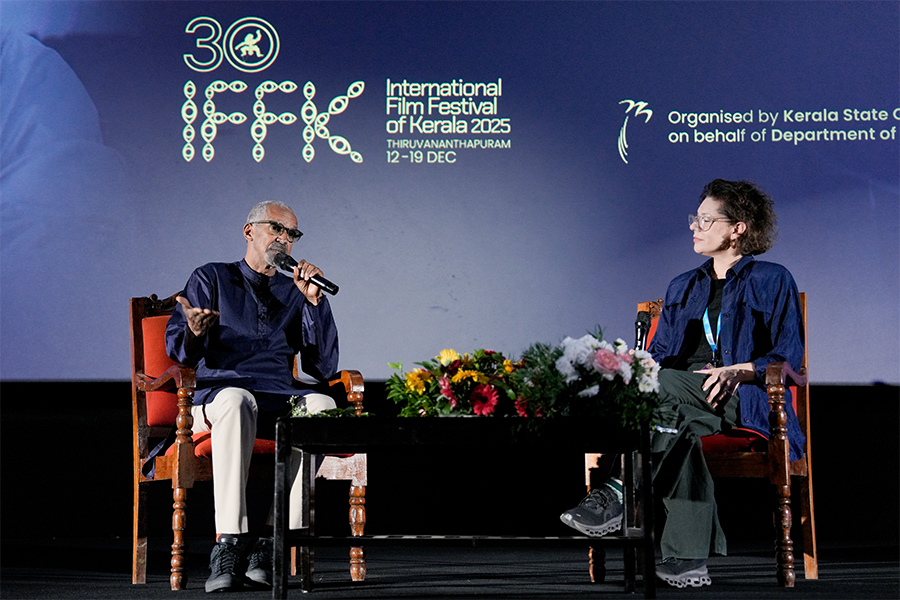
Directors reflect on the challenges of filmmaking
Meet the Director
The Meet the Director session on the fifth day of the 30th IFFK offered a candid glimpse into the often invisible labour behind independent filmmaking. Moderated by filmmakers Balu Kiriyath and Meera Sahib, the discussion brought together directors Rinoshan K, Vishnu K Beena, Maharishi Tuhin Kashyap, Nidhi Saxena and Fazil Razak, whose films span diverse regions, budgets and production realities.
Rinoshan K spoke about The Coffin, a film made on a shoestring budget of ₹2–2.2 lakh, relying largely on the voluntary support of technicians. The project, he said, was sustained by a shared belief in the value of telling meaningful stories, even in the absence of conventional financial backing.
Assamese filmmaker Maharishi Tuhin Kashyap discussed Kok Kok Kokoook, produced with a ₹13 lakh grant from the Satyajit Ray Film and Television Institute. Beyond budgetary constraints, the film posed unusual logistical challenges, including the task of training a rooster that plays a pivotal role in the narrative. Vishnu K Beena noted that Chaav Kalyanam was financed through family support and brought together an entirely new cast and crew, a process that, while demanding, allowed for creative freedom. Fazil Razak, meanwhile, spoke about completing Moham in just 15 days, navigating production obstacles through what he described as sheer commitment and collective resolve.
Offering a contrasting production scale, Nidhi Saxena reflected on The Secret of the Mountain Serpent, a film set against the backdrop of war and centred on women’s desires. Backed by a ₹1.18 crore grant from the Venice Biennale College of Cinema, the film went on to gain international recognition. However, Saxena pointed out that the expectation to complete the project within a tight 10-month schedule proved to be one of its most demanding challenges.
Together, the filmmakers’ accounts underscored the spectrum of realities that define contemporary independent cinema—where ambition, resourcefulness and persistence often matter as much as funding.
Tagore Theatre
11:00 | December 16, 2025
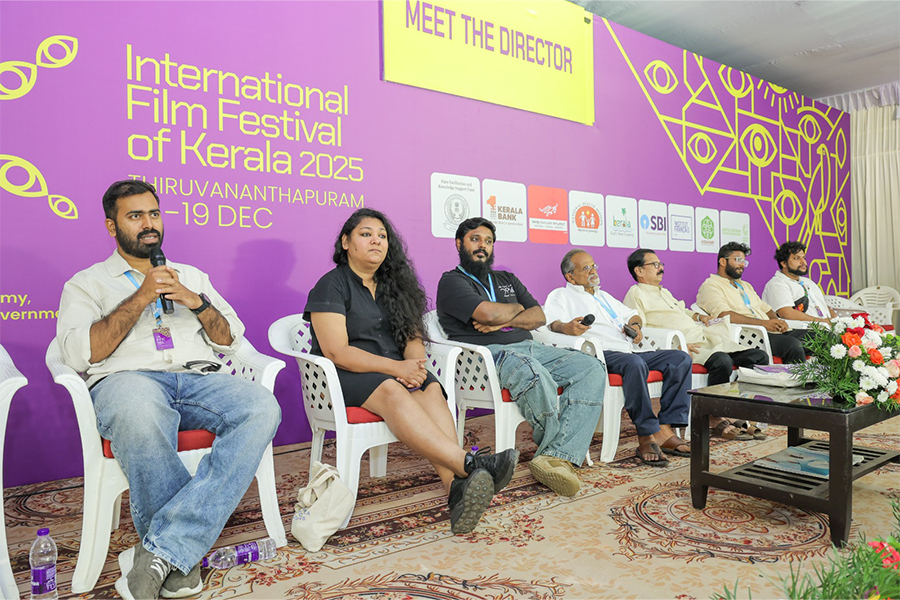
IFFK condemns Film Censorship
Open Forum
Concerns over shrinking creative freedom dominated the Open Forum held on the fifth day of the 30th IFFK, as filmmakers and cultural practitioners mounted a strong critique of film censorship. The session, themed “Freedom of Film Festivals”, was triggered by the Central Board of Film Certification’s decision to deny screening permission to 19 films, a move that participants described as a direct assault on artistic expression.
Veteran filmmaker T. V. Chandran underscored cinema’s role as a vital instrument of free thought. Warning against the climate of fear that censorship breeds, he argued that preventing the screening of a canonical work such as Battleship Potemkin amounted to silencing cinema itself. While referring to the reassurances offered by the Chief Minister and the Minister for Culture, Chandran maintained that sustained protest was essential to guard against future encroachments on the festival’s autonomy.
Filmmaker and former Kerala State Chalachitra Academy chairman Kamal recalled IFFK’s long-standing commitment to amplifying marginalized and underrepresented voices. Since its inception, he noted, the festival has foregrounded cinema from Third World, Afro-Asian and Latin American regions. Censorship decisions, he argued, not only undermine this inclusive vision but also rely on arbitrary reasoning- citing objections to film titles such as Beef and the denial of screening to internationally acclaimed works like Battleship Potemkin, a staple in academic film studies.
Director T. K. Rajeev Kumar questioned the procedural logic behind requiring synopses of films already cleared by Kerala’s local censor boards to be sent to Mumbai for further approval. Adding to the criticism, Premendra Majumdar alleged that clearances were being deliberately delayed, effectively obstructing the screening process.
The forum also addressed the culture of silence within the industry. Director Manoj Kana observed that fear of financial repercussions has often prevented filmmakers from speaking out against curbs on freedom of expression. Actor Alencier, in a symbolic gesture, said he had arrived with a coffin to mark what he described as the looming threat to constitutional values, while also acknowledging the state government for permitting the screening of his film. Actor Santosh Keezhattur concluded by reiterating that cinema, at its core, embodies the creative freedom of its maker.
Together, the voices at the Open Forum reflected IFFK’s enduring role not merely as a showcase for films, but as a site of resistance against censorship and a defender of artistic autonomy.
Tagore Theatre
05:00 | December 16, 2025
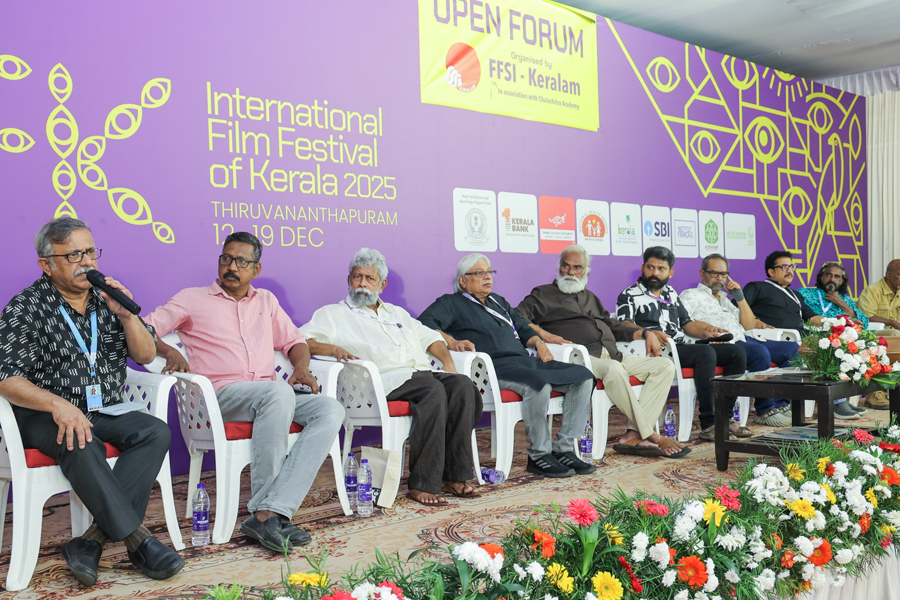
Angela Molina: A life in cinema, a journey through memory
In Conversation
For Angela Molina, cinema has been less a career than a lifelong conversation with art, memory and human vulnerability. The celebrated Spanish actor and jury member of the 30th IFFK revisited this journey, spanning over five decades, during an In Conversation session with director-producer Sebastian Arvale.
Speaking with warmth and candour, Molina reflected on her formative collaborations with some of world cinema’s most iconic filmmakers. Recalling her association with Luis Buñuel when she was just 22, she described the Spanish auteur as her true mentor. Buñuel, she said, had asked to meet her to watch the rushes together, a gesture that marked the beginning of a profound personal and artistic bond. Sensitive to her personal grief at the time, he became a protective, almost grandfatherly presence in her life. Her later collaboration with Pedro Almodóvar in Carne Trémula, Molina noted, further expanded her emotional and performative range, while working with Ridley Scott left a lasting imprint on both her artistic discipline and worldview.
Turning to her recent film Polvo Serran, Molina described it as an intricate meditation on love, autonomy and the right to choose one’s own death. Music and contemporary dance, she explained, operate within the film as psychological refuge rather than ornamentation. She spoke highly of director Carlos Marquette, calling him one of the most sensitive and promising voices of his generation.
Molina also spoke of her enduring connection with India, recalling her first visit at the age of 22 and the sense of wonder the country evoked, a memory that continues to resonate decades later. The session concluded with an animated interaction with the audience, whose questions drew out further reflections, lending the conversation an intimate and contemplative close.
Kairali Sree Nila
02:30 | December 16, 2025
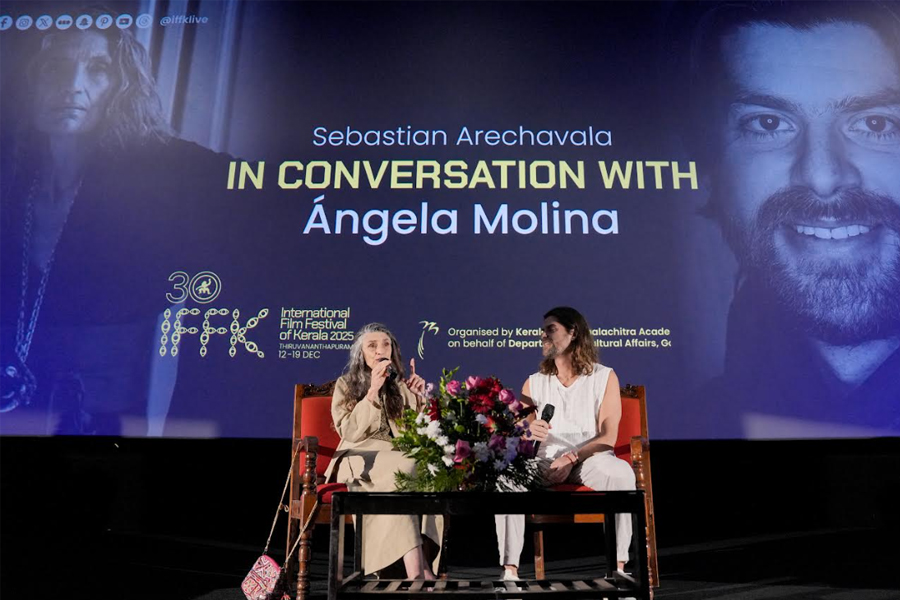
Cinema without Frontiers: Voices from three Continents at IFFK
Meet the Director
For Iranian filmmaker Pourya Kakavand, the screening of The Daughter at the IFFK was more than a routine festival appearance- it marked the fulfilment of a long-deferred personal ambition. “My long-cherished wish to watch my film with a vibrant audience has finally come true in Kerala, thanks to IFFK,” Kakavand said during the Meet the Director session on the sixth day of the festival’s 30th edition.
The session, moderated by filmmaker Meera Sahib, brought together Kakavand, Malayalam director Sanju Surendran and Argentine screenwriter-director Louis Zorraquin for a wide-ranging conversation on filmmaking across geographies marked by differing social and political pressures.
Although The Daughter premiered at the Shanghai International Film Festival, Kakavand was unable to attend the screening owing to the continuing conflict in Iran. Kerala, he said, offered his first opportunity to experience the film alongside an audience. Describing the work as a psychological inquiry into imagined parenthood, Kakavand also spoke candidly about the constraints faced by Iranian filmmakers, who, he noted, are compelled to work under constant surveillance and censorship.
Sanju Surendran, whose Kidki Gaav is competing in the International Competition section, reflected on the film’s setting in a low-income Delhi neighbourhood and its attempt to capture the aspirations and anxieties of young people growing up on the margins of the city. He pointed out that the film received crucial post-production support from the Busan International Film Festival.
Argentine filmmaker Louis Zorraquin spoke about his coming-of-age thriller Kissing Bug, which has been screened at multiple international festivals. IFFK, he said, stood apart because of Kerala’s deeply entrenched film culture and its engaged audiences. Zorraquin also expressed concern over recent cuts to public funding in Argentina, noting that state-backed film institutes traditionally cover nearly 30 per cent of a production’s budget.
Meera Sahib observed that Argentine cinema has had a sustained presence at IFFK since 1999, underlining the festival’s long-standing commitment to global independent cinema. Veteran filmmaker Balu Kiriyath was also present at the session.
Tagore Theatre
11:00 | December 17, 2025
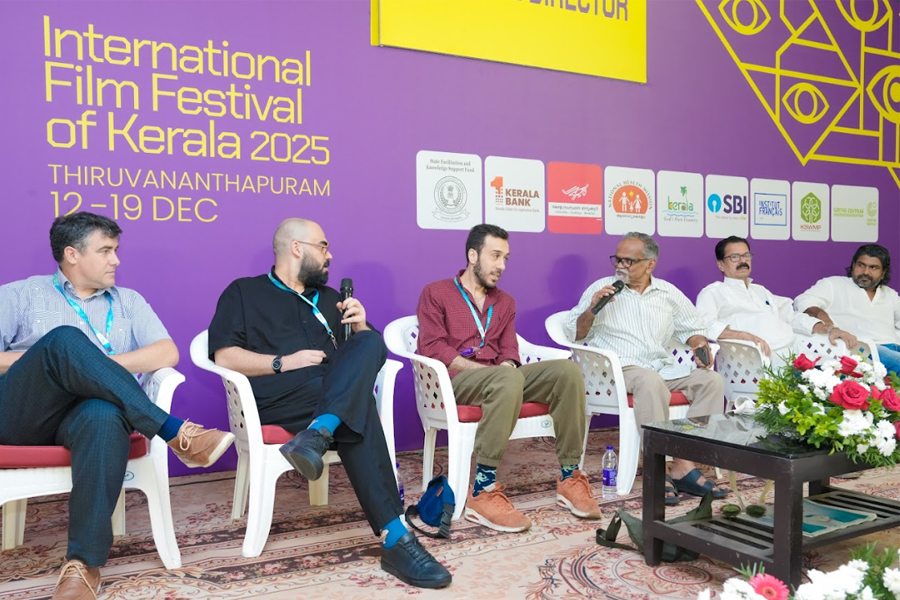
@30: Remembering three decades of the Festival
Open Forum
As the International Film Festival of Kerala (IFFK) marked three decades of its glorious journey, an open forum held on the sixth day of the festival’s 30th edition turned into a moment of collective introspection. Moderated by Kerala State Chalachitra Academy Secretary C. Ajoy, the session revisited the festival’s evolution while also gesturing towards its future in an increasingly fragmented cinematic landscape.
Veteran filmmaker Adoor Gopalakrishnan underlined the distinctive expectations of IFFK’s audiences, noting that viewers here seek cinema that transcends the routine through technical innovation and aesthetic experimentation. The sustained and enthusiastic presence of young audiences, he observed, has been central to keeping the festival intellectually alive and culturally relevant.
Film critic V. K. Joseph traced the roots of IFFK to Kerala’s vibrant Film Society movement, which, he said, provided the ideological and organisational foundation for the festival. He argued that the Open Forum itself—built around free debate, pluralism and democratic engagement—sets IFFK apart from many other international film festivals, where such participatory spaces are increasingly rare.
Filmmaker T. K. Rajeev Kumar described the festival’s three-decade journey as both successful and transformative, pointing to its lasting impact on the viewing habits and cinematic sensibilities of Malayali audiences. According to him, IFFK has functioned not merely as a screening platform but as a cultural institution that has shaped how cinema is watched and discussed in Kerala.
The session saw the participation of former KSCA Vice-Chairperson and former IFFK Artistic Director Bina Paul, along with filmmakers Kamal, V. R. Gopinath, Meera Sahib, Dr. Babu Gopalakrishnan, K. V. Mohankumar and several other prominent figures from Kerala’s film fraternity, underscoring the festival’s enduring role as a meeting ground for diverse cinematic voices.
Tagore Theatre
05:00 | December 17, 2025
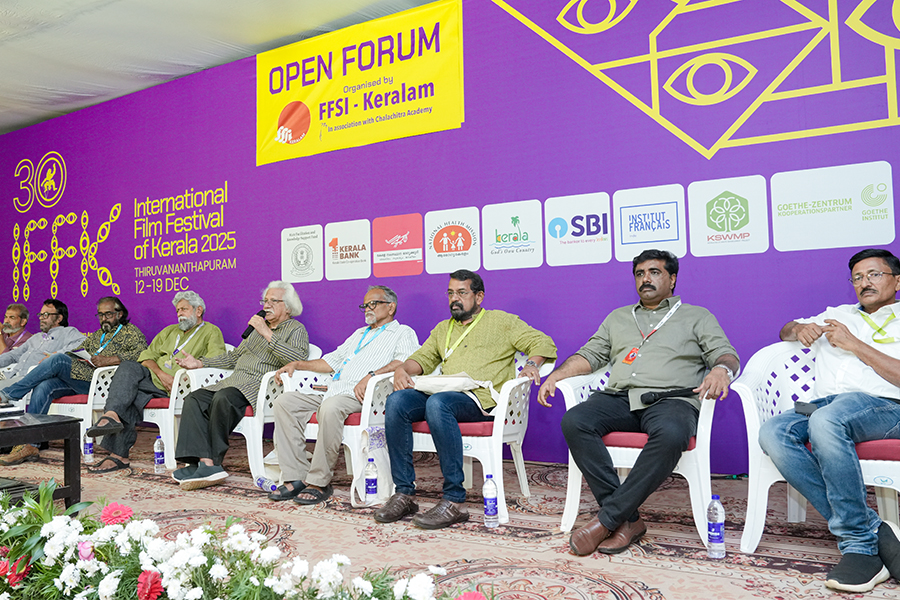
Cinema thrives on young commitment- T.D. Ramakrishnan
Seminar
At a time when Malayalam cinema is increasingly being cited as a reference point for the rest of the country, writer T. D. Ramakrishnan attributed its momentum to the collective energy of a new generation of filmmakers. Speaking at the national seminar “Malayalam Cinema: India’s New Cinematic Compass”, held on December 17, 2025, as part of the 30th IFFK, Ramakrishnan argued that the industry’s recent successes are rooted in the commitment and imagination of a broad pool of young creative talent.
Balancing a strong sense of tradition with a curiosity for the wider world, Malayalam cinema’s 21st-century trajectory, he said, reflects both continuity and reinvention. The post-pandemic expansion of OTT platforms has further accelerated this shift, opening up access to world cinema and new technologies. This convergence, Ramakrishnan noted, has enabled the coexistence of commercially viable films and works of significant artistic ambition—positioning Malayalam cinema as a continuing guidepost for Indian filmmaking at large.
Filmmaker Sudhir Mishra traced the evolution of the industry’s cinematic language through recent landmark works such as Jallikattu, Bhramayugam and Manjummal Boys. Focusing on Manjummal Boys, he observed that the film moves beyond a conventional narrative of friendship to offer a distinctive cinematic experience, driven by meticulous craft and inventive formal choices.
The discussion also turned to experimentation as a defining impulse. Rahul Sadashivan’s Bhramayugam, with its stark black-and-white visual grammar, was cited as a reinvention of the horror genre, while Lijo Jose Pellissery’s Jallikattu was described as a visceral capture of Kerala’s social and emotional terrain. Films anchored in political clarity and strong conceptual frameworks, the speakers suggested, point towards the future direction of Malayalam cinema.
Acknowledging the material constraints behind creative ambition, actor-director Aditya Baby spoke about negotiating financial pressures while striving to sustain cinema of artistic value.
The seminar concluded in the presence of emerging voices and industry figures, including young filmmaker Natesh Hegde and Kerala State Chalachitra Academy Secretary C. Ajoy, reinforcing the sense of a shared, forward-looking energy shaping the next phase of Malayalam cinema.
Kairali Sree Nila
02:30 | December 17, 2025
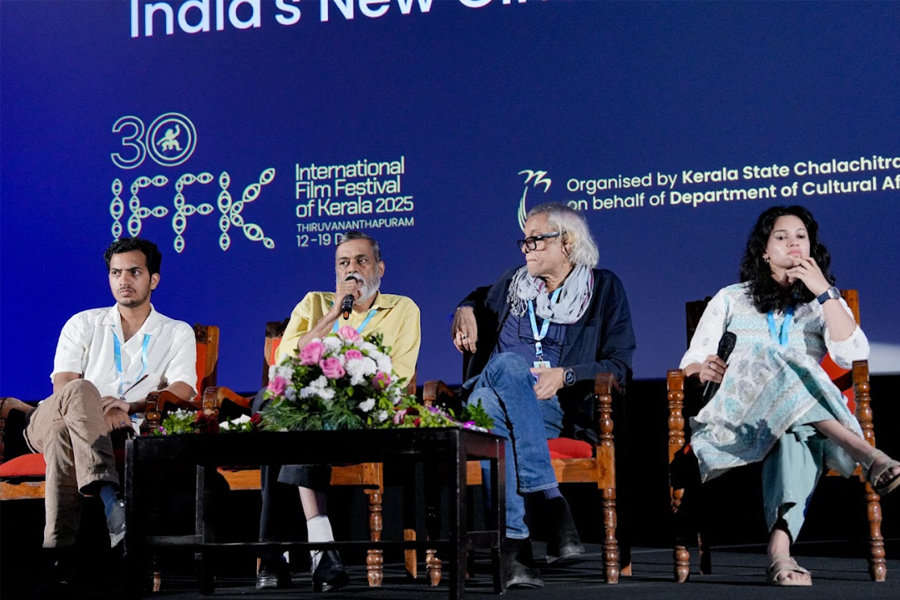
Malayalam filmmakers reflect on a changing industry
Open Forum
The open forum held on the seventh day of the 30th IFFK brought together prominent contemporary filmmakers to reflect on the ‘new ambience’ shaping Malayalam cinema, on the topic ‘Malayala Cinemayude Navabhavukathwam’.”
The discussion featured filmmakers whose works have drawn attention at this year’s festival, including Unnikrishnan Avala, Rajesh Madhavan, Sanju Surendran, Jeo Baby, Sherry Govindan, Nipin Narayanan, Gritto Vincent, Sreejith S Kumar and Sreekumar K. Their participation underlined the diversity of voices and approaches that define Malayalam cinema today.
Sanju Surendran spoke about the evolving grammar of Malayalam films, observing that works such as Thanthapperu and Khidki Gaav, which have made an impact on international festival circuits, reflect a renewed confidence capable of resonating beyond regional boundaries. Nipin Narayanan echoed this view, noting that Malayalam cinema has increasingly moved beyond rigid commercial frameworks to engage with universal themes and audiences.
Gritto Vincent pointed out that the conventional divide between art and commercial cinema is steadily dissolving, emphasising that the primary objective of filmmaking remains effective storytelling that connects with viewers. Adding to this, Sreejith S Kumar said the international appreciation received by films rooted in local contexts demonstrates the ability of authentic narratives to transcend linguistic and cultural barriers.
Industry veteran Sreekumar K observed that a strong story holds value across contexts, and that mainstream cinema often absorbs and adapts the creative impulses introduced by art-house films—an exchange he described as central to the vitality of Malayalam cinema.
Jeo Baby highlighted the role of festivals such as IFFK in energising independent cinema and providing crucial platforms for alternative voices. While welcoming the creative resurgence, Unnikrishnan Avala raised concerns about the limited reach of many independent films beyond the festival circuit.
The discussion also opened up larger questions about how society is responding to the neo-realist tendencies influencing Malayalam cinema today, reflecting the industry’s ongoing negotiation between tradition, experimentation and audience engagement.
Tagore Theatre
05:00 | December 18, 2025
